- Home
- Natalia Ginzburg
Happiness, as Such Page 3
Happiness, as Such Read online
Page 3
“Can’t you ask your sister to come here? Don’t you have anyone who can come help?”
“No. That sister is married now to an agriculturist. I wrote her after the baby was born and he answered — this agriculturist I’ve never even met. He told me they were moving to Germany and that I should go to hell. Not in those exact words but almost.”
“I see.”
“When a woman’s had a baby she wants to show everyone. That’s why I want Michele to see him. We’re good friends. We had a good time together. He can be so funny. I went out with other men but always had fun with him. It never even crossed my mind to marry him. I’m not even in love with him! I was only in love once, back in Novi Ligure, with my cousin’s husband. But we never had sex because my cousin was always around.”
“Michele says that he’ll get you money. He’ll ask his parents. He’ll come by too. One way or the other. Though he says that newborns make him nervous.”
“I want money. I know he told you to be nice to me but I think you’d be nice anyway, even if he hadn’t asked you to. You have a gentle nature. It’s weird that you and me never had sex. It’s never crossed my mind. Yours either, I bet. Sometimes I wonder if you’re gay, but I don’t think so.”
“No,” he said.
“So it never occurs to you to have sex with me?”
“Never.”
“Do you think I’m ugly?”
“No.”
“Pretty?”
“Pretty.”
“But you’re not attracted to me. You’re indifferent.”
“Well, to tell you the truth, yes.”
“Go to hell. That’s not a very nice thing to say.”
“The baby’s stopped nursing. He’s asleep,” said Osvaldo.
“Yes, well this baby is quite a handful.”
“He’s hardly a handful. He doesn’t do anything but sleep.”
“He’s a handful even when he’s sleeping. I know I made a mess of things. Don’t think I don’t know.”
“What’s wrong? Are you crying now?”
“Go beat the milk.”
“I’ve never beaten milk in my life,” said Osvaldo.
“That doesn’t matter. Read the instructions on the box. Jesus Christ. Help me out.”
3
December 2, 1970
Dear Michele,
Osvaldo came over last night to tell me you left for London. I’m speechless and very upset. Osvaldo said that you stopped by your father’s house to say goodbye but he was sleeping. What does that mean, “you stopped by”? Don’t you understand how sick your father is? Povo — or Covo — says that he’ll have to be moved to the hospital today.
You asked for shirts and woolens. Osvaldo says you’re thinking about spending the whole winter there. You could have called me. You could have gotten me at the phone booth the way you have in the past. I am going to go mad if they don’t install a telephone here. I would have come to the airport. I would have brought you clothes. Osvaldo says you left wearing some canvas pants and a red shirt. He says you had nothing, or practically nothing, to change into. You left all your clothes, clean and dirty, at the workshop. He couldn’t even remember at first if you had a jacket with you. Then he remembered you did. That was comforting.
He said you showed up at his house early in the morning. And, according to him, this idea of yours to go study sculpture in London was something you’d been contemplating for a while. Because you’re sick of painting those owls. I understand that. I’m writing you at this address Osvaldo gave me even though he says it’s temporary. The fact that Osvaldo knows this elderly lady who’s giving you a room reassures me a little, a very little. It’s not as if I haven’t figured out that you’re running away. I’m not a fool. I’m pleading with you to please answer right away. Explain what you’re running away from, or who. Osvaldo was not very helpful on this point. Either he didn’t want to tell me or he didn’t know.
Either way, you’re gone now. I paid Osvaldo back the money you borrowed. Which is to say I paid his wife back. I wrote the check out to his wife. Osvaldo says that his wife always has cash on hand at the house, otherwise there wouldn’t have been a way for you to leave on a Saturday. Osvaldo got here last night at ten. He was exhausted from the whole business at the police station, getting your passport renewed, then driving you to the airport, and then he had to go somewhere on the outskirts of the city to pick up his wife’s car, which you loaned to someone . . . Who knows who. He hadn’t eaten and I didn’t have anything in the house except for some random cheeses Matilde had bought at the supermarket that morning. I put out all the cheese and Matilde made a scene. Matilde then provided the entertainment by talking about French Impressionism. She fanned her face, smoked her pipe, and paced back and forth with her hands in her pockets. I could have killed her. I wanted her to leave so I could ask Osvaldo more about you. The twins were there too playing ping-pong. At last everyone went to sleep.
I asked him if you left because of that Mara Castorelli who wrote me about her baby. Osvaldo told me the baby isn’t yours. According to him the girl has nothing to do with your departure. He says she’s just a lost soul with no money. There are no chairs in her apartment, or blankets, and he was thinking of bringing her a blanket and chairs from your studio, since they’re not doing anyone any good there. He also asked if he could take that green, wood-burning stove, the one with the decoration, by which he means the German stove. I told him that it needs to be disconnected from the exhaust pipe in the wall and it might be too complicated. It made me think of the day I went to buy it for you so I’m sentimental about it. You will certainly say that it’s stupid for a person to love a wood stove. Osvaldo told me you never light it because you can never remember to order wood, so you use the electric one instead. I ended up telling him that he could do whatever he wanted with the chairs and the stove. I asked him if you’d gotten involved with any radical political groups. I have this terrible fear that you’re going to end up joining the Tupamaros. He said he didn’t know who you’d been associating with recently. He said it was possible that you were running from something. He wasn’t very clear.
I can’t figure out if I like him. He’s polite. It’s the kind of politeness that makes you feel full, as if you’ve eaten too much jam. He has that red face and he’s always laughing. But I don’t know what there is to laugh about. Sometimes I look at him and wonder if he isn’t a pedophile. I could never really understand why you were such good friends. You’re a child and he’s a grown man of thirty-six, maybe thirty-eight years old. You’ll just say that I worry too much about you. There is an endless list of things I can worry about.
He says he doesn’t have any relatives who work at the phone company but his wife Ada might know someone. He promised he’d ask her for me. I don’t know how any of us would survive without Ada. She gave you cash to leave. She called someone about your passport, which you wouldn’t have gotten otherwise. You should write and thank her. Osvaldo says that she was already up at seven to treat her terra-cotta pavement with petroleum. I have terra-cotta tiles too but we’ve never treated them with petroleum. In fact, they are so dark I don’t think Cloti washes them at all.
The morning of the day before yesterday, Matilde came with me to visit your father. He was sitting up in bed when we got there, smoking and making phone calls and for a few minutes he didn’t seem sick at all. He was on the phone with an architect. I don’t know if you’re aware that the week before he fell ill your father bought a tower on the Isola del Giglio. He didn’t pay much for it, at least that’s what he claims. As far as I can tell it’s a crumbling tower, probably full of weeds and snakes. Your father got it into his head that he’d add bathrooms and walls, and so on. He wouldn’t get off the phone when we walked in, he just waved at Matilde and kept talking with that gravelly voice. She acted patient and started leafing through a magazine. When your father hu
ng up the phone he told her that she seemed much fatter. Then she started in on him about the time she’d given him a draft of her novel, Polenta and Poison, to read but that he’d left it in the bar at the train station in Florence. It was the only clean, typed copy and it was in a blue folder. Matilde wrote to the bar but the blue folder was never found. After that she lost all desire to retype and revise it, she was so discouraged and disappointed. The fact that he’d lost the blue folder seemed central to the problem. Then they started arguing about the vineyard near Spoleto that they own together. She wants to sell it and your father doesn’t. The other morning your father had mentioned he was sorry he’d lost the blue folder but that Polenta and Poison was an inane novel and the world was better without it. Then he had a wave of pain, nausea and pain. Then the architect walked in — the one who’s working on the tower — but your father didn’t have any desire to look at tiles and pick little blue flowers or little brown flowers. The architect is six feet six inches tall. He seems more like an idea. There was something completely incompetent about him. We told him to come back later and he threw the tiles into his bag, grabbed his trench coat, and ran off.
I need you to write immediately with an address that’s not temporary. I’m thinking I can send you some money and clothes with someone who is headed to London. I’ll find someone. In the meantime, I’ll keep writing you at this address. I’ll send news about your father. I think I’ll tell him you had to rush off because they were closing registration at the sculpture school. Either way he considers you to be very responsible. He thinks that you do everything the only way it should be done.
My rabbits arrived. There are four of them. I called in a carpenter to build cages. I knew I wouldn’t be able to rely on you for this tiny favor. I understand it’s not your fault. But the way things go it seems like I can never count on any little favors from you.
Your mother
4
December 3, 1970 — London
Dear Angelica,
I left in such a hurry because they called in the middle of the night to tell me Anselmo had been arrested. I called you from the airport but you didn’t answer.
I’m sending this letter with someone — he’ll bring it to you by hand. His name is Ray. I met him here. He’s from Ostend. He can be trusted. Give him somewhere to sleep if you have room. He needs to stay in Rome for a few days.
I need you to go to my house right away. Make up some excuse to get the keys from Osvaldo. Tell him you need a book. Tell him whatever you want. Don’t forget to bring a suitcase or bag with you. There’s a dismantled machine gun wrapped in a towel, inside the wood stove. I totally forgot about it before I left. That will seem strange to you but it’s how it was. My friend Oliviero brought it to me one night a few weekends ago because he thought the police might search his place. I told him to tuck it in the stove. I never light that stove. It burns wood and I never have wood. I hid the gun in the stove and then forgot all about it. I remembered after I was on the plane, already in the air. It was like I suddenly got drenched in a boiling sweat. They say fear makes you break out in a cold sweat. That’s not true. Sweat can be boiling. I had to take off my sweater. You should bring a suitcase or bag to put the gun into. Unload it onto someone you’d never suspect. Like the woman who comes to clean for you. Or you could get it back to Oliviero. His name is Oliviero Marzullo. I don’t have his address but someone does. Now that I think about it, the gun is so old and rusty you could just throw it in the Tiber. I’m not asking Osvaldo to do this for me, I’m asking you. I’d actually prefer if Osvaldo never knew. I don’t want him to think I’m a complete imbecile. But if you feel strongly that you want to tell Osvaldo, go ahead. If he ends up thinking I’m an idiot, what do I care.
Of course my passport had expired. Of course Osvaldo helped me get it renewed, all in a matter of hours. Gianni was at the airport too and we got into it because Gianni thinks there’s a fascist spy in the group. Maybe more than one. I’m sure he’s just imagining things. Gianni won’t leave Rome but he never spends more than one night in the same place.
I stopped by to see our father before I left. Osvaldo waited for me in the car. Father was fast asleep. He looked very old and very sick.
I’m well. My room here is long and narrow and the wallpaper is tattered. Everything about this place is long and narrow. There’s a hallway and all the bedrooms open off the hallway. There are five of us boarding here. We pay four pounds a week. The landlady is a Romanian Jew who sells skin cream.
When you have time, will you go see a girl I know who is staying on Via dei Prefetti. I don’t remember the address but Osvaldo has it. Her name is Mara Castorelli. She just had a baby. I gave her money for an abortion but she didn’t get it. I slept with her a few times so the baby could be mine. She was with a lot of men though. Bring her a little money if you can.
Michele
Angelica was sprawled on the couch in her dining room reading the letter. It was a small, very dark, dining room. The table took up almost all the space and was overflowing with books and papers. A lamp and a typewriter teetered on top of the stacks. Oreste, her husband, worked at the table, but he was in the bedroom now sleeping because he worked nights at the newspaper and usually slept until four in the afternoon. The kitchen door was open and she could see her friend Sonia with her daughter Flora, sitting with the boy who’d brought the letter. Flora was eating bread dunked in Ovaltine. She looked like a green, five-year-old girl lizard — wearing a blue pinafore and red wool tights. Angelica’s friend Sonia was hunched over the sink washing last night’s dishes. She was tall, shy, and wore glasses. Her long, black hair was pulled back into a ponytail. The boy who’d brought the letter was eating a plate of reheated penne with tomato sauce leftover from Oreste’s dinner. He wore a faded turquoise windbreaker that he didn’t want to take off because he’d caught a chill while traveling. His short, chestnut beard was sparse and well groomed.
Angelica finished reading the letter and stood up from the couch to look for her shoes under the carpet. Her tights were the color of moss. She was wearing a rumpled sweater that she’d been wearing since the day before at the hospital. Her father had gone into surgery and died overnight.
Angelica twisted her fine blonde hair into a bun on top of her head and secured it in place with several combs. She was twenty-three years old. She was pale, tall, and her face was a little too long. Her eyes were green like her mother’s but shaped differently — long, narrow, and slanted. She pulled a flowered black tote down from the wardrobe. She already had Michele’s studio keys from Osvaldo because she had planned to collect his dirty laundry and take it to the cleaners. The keys were in her jacket pocket. It was a black nylon jacket she’d bought used at Porta Portese. She put it on, called into the kitchen that she was going out shopping, and left.
Her Fiat was parked in front of Chiesa Nuova. She climbed into the car and sat for a moment without moving. Then she drove toward Piazza Farnese. She remembered a day last October when she’d run into her father on Via dei Giubbonari. He was walking toward her with his long stride, hands in his pockets, long black curls swept back in the wind, his tie blowing, that black alpaca coat, as always, rumpled and unbuttoned, his broad brown face and large mouth, the expression bitter and disgusted, as always. She had been coming out of the movies with her daughter. He extended his hand, soft, sweaty, limp. They hadn’t kissed each other in years. They didn’t have much to say either since they didn’t see each other often. They got some coffee and stood at the bar. He bought the child a big, cream pastry. When Angelica expressed doubt that it was fresh, he was offended and said that he always came to this bar and he’d never had an old pastry. He told her that a friend of his lived right upstairs, an Irish cello player. While they were drinking their coffee, the Irish woman showed up. She was plump and not beautiful, her nose looked like a shoe. They were going out to look for coats because the Irish woman wanted to buy one. They all went tog
ether to a clothing store in Piazza del Paradiso. The Irish woman tried on coats. Her father bought a poncho with pictures of deer on it for Flora. The Irish woman picked out a long black buckskin coat lined with white fur that she was very pleased with. Her father paid, pulling a handful of crumpled bills from his pocket. The edge of a handkerchief stuck out of his pocket. He always had a bit of handkerchief coming out of his pocket. Then they went to the Medusa Gallery where her father was hanging a show that was about to open. The gallery owners were two young men in leather jackets who were determined to handwrite the invitations to the opening. The paintings were almost all hung and there was a big portrait of her mother, painted many years earlier when her mother and father were still together. Her mother was at the window, hands folded under her chin. She was wearing a blue and white striped shirt, her hair a cloud of fiery red. Her face was a parched triangle, sardonic and full of lines, while her eyes were heavy, contemptuous, and dim. Angelica remembered their house on Pieve di Cadore where they lived when he’d painted that picture. She recognized the window and the green awning over the terrace. The house had been sold later. Her father paused in front of the painting, his hands in his pockets, and he spent a long time praising the palette which he described as acid and cruel. Then he commenced praising every one of his paintings. Recently he’d started working on an enormous scale, using canvases upon which he’d piled every manner of object. He’d discovered a heaping technique. Boats, cars, bicycles, trucks, dolls, soldiers, gravestones, naked women, and dead animals, floating in a murky green haze. In his bitter, gravelly voice, her father said that no one working in that moment was able to paint with such vastness and precision. His work was tragic and solemn, gigantic and detailed. He referred to “my pain-ting,” landing on the t with an asthmatic flourish — solitary and painful. Angelica didn’t believe a word of what he was saying and thought that the Irish woman and the gallery owners didn’t either — maybe her father didn’t believe a word he was saying or the grating way he was saying it. His voice echoed piercing and isolated. A broken record. Angelica suddenly remembered a song her father used to sing while he was painting, a childhood memory. It had been many years since she’d been there when he was painting.

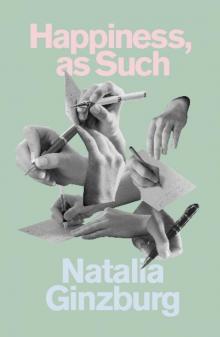 Happiness, as Such
Happiness, as Such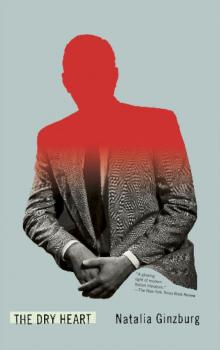 The Dry Heart
The Dry Heart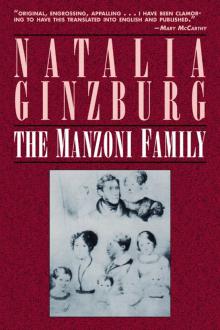 The Manzoni Family
The Manzoni Family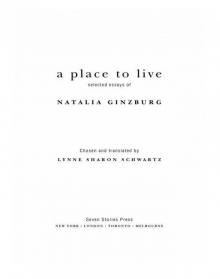 A Place to Live
A Place to Live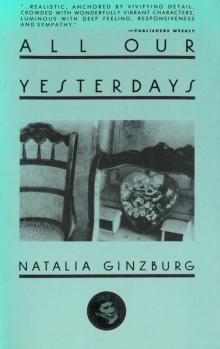 All Our Yesterdays
All Our Yesterdays The Little Virtues
The Little Virtues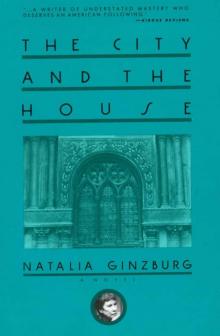 The City and the House
The City and the House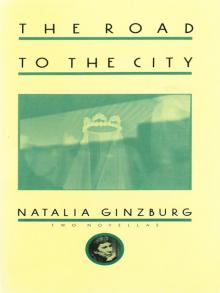 The Road To The City
The Road To The City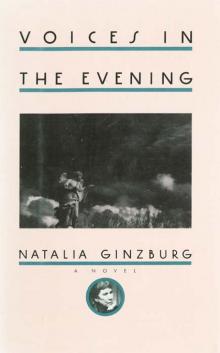 Voices In The Evening
Voices In The Evening